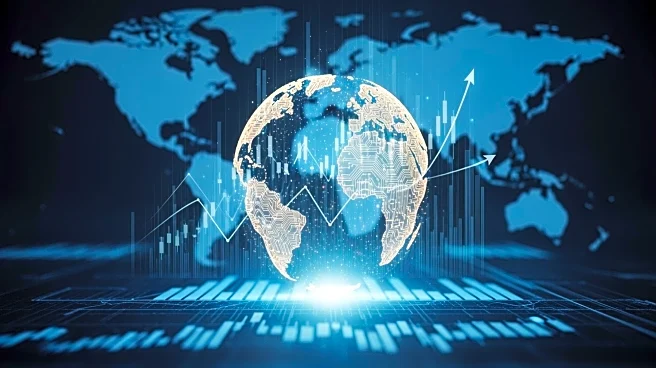What's Happening?
The International Monetary Fund (IMF) has revised its growth forecast for the U.S. economy, projecting a 2% expansion in 2025, slightly higher than previous estimates. This adjustment comes as President Trump's tariffs have been less disruptive than initially
anticipated. Despite the positive outlook, the IMF warns that the extensive duties still pose risks to economic stability. The global economy is also expected to grow by 3.2% this year, up from a previous estimate of 3%. The IMF's chief economist, Pierre-Olivier Gourinchas, noted that the ongoing uncertainty from tariff threats continues to weigh on the world economy. Additionally, investment in artificial intelligence has helped offset some of the negative impacts of trade disruptions, boosting the U.S. economy.
Why It's Important?
The IMF's upgraded forecast suggests that the U.S. economy is showing resilience despite the challenges posed by tariffs. This is significant for businesses and investors, as it indicates a potentially stable economic environment in the near term. However, the ongoing uncertainty related to trade policies could still impact business investment and consumer spending. The growth in AI-related investments highlights a shift in economic drivers, with technology playing a crucial role in sustaining economic momentum. The IMF's report also underscores the importance of monitoring inflation and hiring trends, which could be affected by tariff-induced price increases.
What's Next?
The IMF's outlook suggests that while the U.S. economy is currently stable, there are potential risks that could affect future growth. Businesses may need to adapt to changing trade patterns and consider the impact of tariffs on their operations. The ongoing investment in AI could lead to further economic shifts, potentially influencing central bank policies on interest rates. Stakeholders will need to watch for signs of inflation and changes in hiring practices as the effects of tariffs continue to unfold. The global economic landscape may also shift as countries like China adjust their export strategies in response to U.S. tariffs.
Beyond the Headlines
The IMF's report highlights the complex interplay between trade policies and technological advancements. The investment surge in AI echoes the dot-com boom of the late 1990s, suggesting potential for both growth and volatility. The report also points to the agility of the private sector in adapting to tariff challenges, which may offer lessons for future trade disruptions. The broader implications for global trade dynamics and economic resilience are significant, as countries navigate the challenges posed by protectionist policies.















